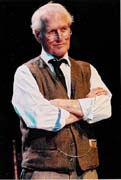
KOMISAR'S CURTAIN-RAISERS
by Lucy Komisar
 |
Paul Newman in "Our Town" (Joan Marcus photo) |
'Our Town.'
Written by Thornton Wilder.
Directed by James Naughton.
Booth Theater, 222 West 45th Street
Telecharge (212) 239-6200.
Opened December 4, 2002.
Reviewed by Lucy Komisar December 11, 2002.
Thornton Wilder's play about the American heartland is, some say, an elegy to the eternal truths of human existence.
It can just as well be viewed as a subtle, gentle indictment of the small-mindedness and stultifying boredom of small-town America. Wilder wrote it in 1938, when Hitler had incorporated Austria and was poised to pounce on Czechoslovakia just before World War II. The play takes place from 1901 to just before World War I; it was supposedly a time of inward-looking innocence.
This was an innocence that, as in the later period, included basic racism. Polishtown was on the other side of the tracks from the Protestants in Grovers Corners, N.H., as the stage manager (Paul Newman) points out on a chalk diagram. The Poles worked in the mill.
Director James Naughton has established a surreal mood by using pantomime and related sound effects. The milkman leads an invisible, loudly clopping horse down the street, past the painted backdrop of the mill. The cast is excellent, and especially in the first act, makes even prosaic events catch your interest.
A professor (the comically, effusive John Braden) is invited to tell the town history, and notes that most of the people are blue-eyed, but there are some with dark eyes, since the advent of "some Slavs and Mediterraneans."
The doctor lived in the big house on the hill -- Newman pauses and emphasizes the word with a quiet irony. Newman has the good sense not to play the star. In white hair, rimless glasses, vest and watch chain, he is a slightly bemused, folksy host who watches events with affection but also detachment.
"Is no one aware of social prejudice and industrial inequality," demands a citizen (Reathel Bean) marching down the audience aisle. A "citizen" in the balcony inquires about "culture." There's isn't much. The town seems quite deadly.
The newspaper publisher, Mr. Webb (Jeffrey DeMunn), is a caricature, an irascible fellow whose blood vessels appear ready to burst. Frank Converse's Dr. Gibbs is smug and unyielding. Jayne Atkinson plays Mrs. Gibbs as a complex person who still has a spark in spite of her husband's rigidity. Across the way, Jane Curtin etches a bit of sadness into the character of Mrs. Webb, who has evolved into someone whose identity is only "wife-mother." An essential element of Wilder's thought is what the town does to women who were particularly controlled.
It's fascinating to see how Emily Webb (a perky Maggie Lacey) changes from girlhood to young matron. As a high school student, she is a lot smarter than George Gibbs (Ben Fox), who asks for help with his math. But he's the one with the chance to go to college (which he rejects), and by the time Emily becomes a wife, she seems clearly dumbed down.
Though the constellation of characters is interesting for what they represent, the plot slowly descends into the terminally corny.
The only relief from boredom comes when the scowling Stephen Spinella as the alcoholic choir master insults the nice ladies in their dark-print, long dresses and cluttered straw hats. Spinella makes you wonder what secrets his rigid and funereal face may hide.
There are no secrets apparent in the grinning visage Emily oddly presents at her entrance to the graveyard. Maybe that's because she's now as empty-headed as the rest. [Komisar]
Theater critic Lucy Komisar gives pre-show briefings and post-show discussions for theater parties to enrich playgoers' experiences. She'll also help find an appropriate show and make or advise on arrangements. Interested parties may telephone (212) 929-1610 for information.
| museums | recordings | coupons | publications | classified |